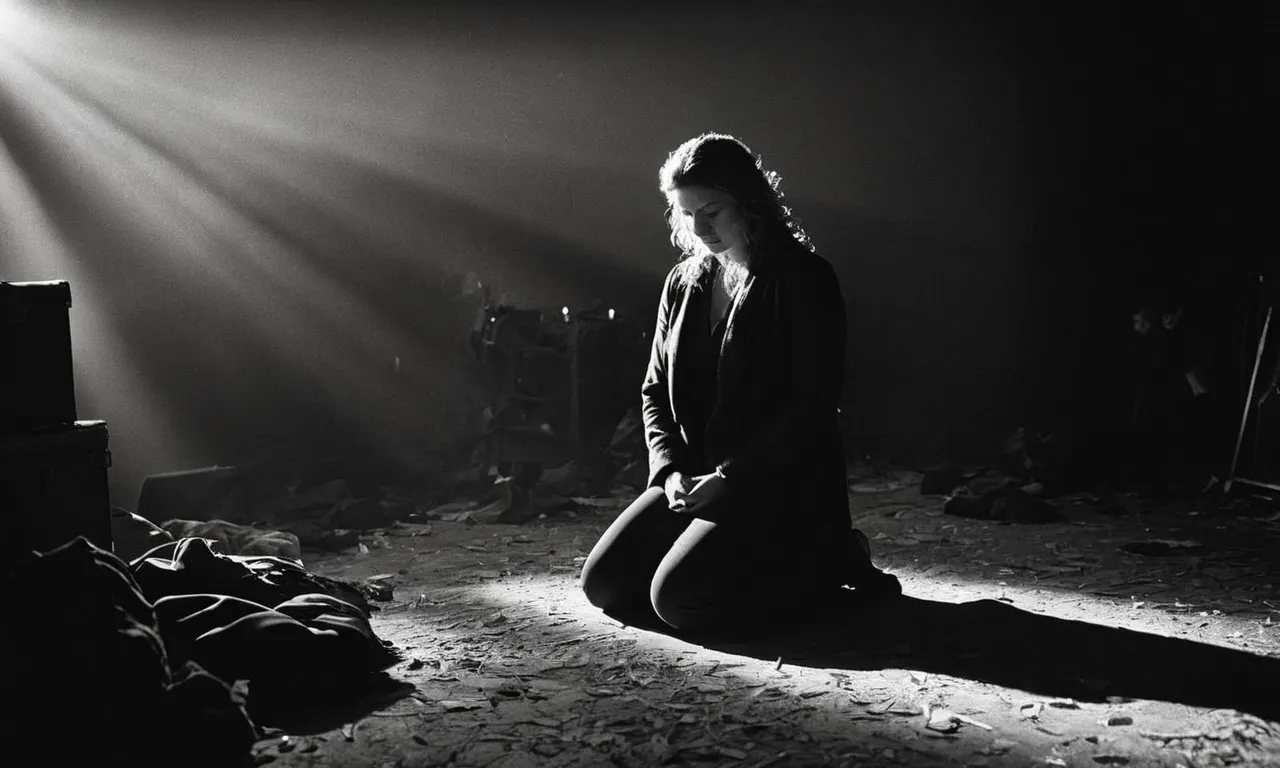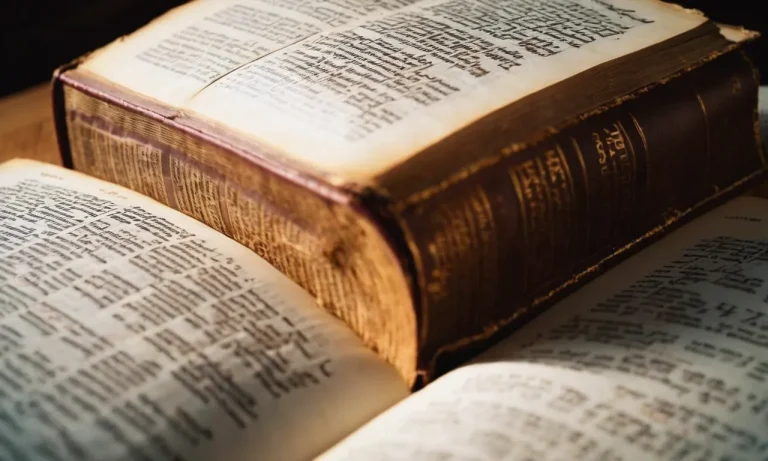What Does God See When He Looks At Me?
Whether you’re a devout believer or a skeptic, the question ‘What does God see when he looks at me?’ has crossed all of our minds. The curiosity behind knowing how the divine views us is universal. In this comprehensive guide, we’ll explore possible answers to this profound question.
If you’re short on time, here’s a quick answer: According to most faiths, God sees the pure essence of your soul when he looks upon you. Your outward identity and earthly deeds matter less to God than the condition of your spirit and intention in your heart.
Overall, God sees you as his beloved child, created in his divine image.
By examining religious texts, spiritual teachings, and accounts from mystics throughout history, this article will uncover the layered ways God may perceive humankind. Expect reflections on how the divine sees us in our vulnerability, struggles, potential for good or evil, and as emanations of God’s own Self.
We’ll also explore if feelings like disappointment ever cross God’s mind when looking upon us. The path to understanding God’s vision of humanity promises to be enlightening for people of all backgrounds.
The Purity Within: God Sees Our Inner Essence
The Soul as a Spark of the Divine
Many faiths believe each person has an eternal soul, a divine inner essence. This inner spark connects us to the greater divinity or divine cosmic consciousness. Though our bodies are mortal, our souls carry on after death.
God sees this undying purity at our core – beyond outward identity and mortal trappings, God recognizes each soul as an emanation of the divine.
This idea appears in Hinduism’s Atman, the eternal self identical to Brahman or ultimate reality. Buddhism teaches of the unconditioned luminous mind obscured by delusions. The mystic traditions within Islam, Judaism and Christianity similarly point to an inner divine essence.
God always perceives this inner holiness shining through.
Beyond Outward Identity: God Sees the Heart
As 1 Samuel 16:7 states, “…Man looks at the outward appearance, but the Lord looks at the heart.” Our physical attributes, social roles and material possessions capture only the surface. God cares more about who we are internally – our compassion, integrity, wisdom and capacity for love.
We get caught up in surface judgments about ourselves and others based on race, gender, status, etc. But God transcends these earthly categories, seeing each person’s unique divine worth. External signifiers cannot touch the beauty of our inner light.
This applies to our own self-perception too – when judgments cloud how we see ourselves, God still affirms the goodness within.
The Inner Child Within Us All
Jesus taught his followers to “become like little children” (Matthew 18:3). Children often symbolize innocence and lightheartedness. Though we take on layers of conditioning through life’s difficulties, deep down that pure inner child still resides.
God always perceives this original innocence – the unconditioned goodness preceding our worldly conditioning.
We might judge ourselves harshly based on mistakes from the past. But God does not define us by our wounds – God sees us through the eyes of unlimited compassion. There is a playfulness, sincerity and simplicity that lies beneath our hardened exterior.
God recognizes the precious inner child still shining within all of us.
The Eyes of Unconditional Love
God’s Love for Us Transcends Our Flaws
God’s love for us is perfect and unconditional. As humans, we are flawed and make mistakes, yet God looks past our imperfections and shortcomings and loves us wholeheartedly for who we are. His grace and mercy know no bounds.
No matter how many times we stumble and fall, God is always there with open and forgiving arms, ready to pick us back up. His love is steadfast and eternal.
We may judge ourselves harshly and feel unworthy of God’s love due to our flaws and failures. But God sees us through the eyes of grace. He knows we are imperfect and loves us anyway. To God, we are His beloved children and He treasures us beyond measure.
Our flaws do not diminish His love for us one bit. As the Bible says, “For I am convinced that neither death nor life, neither angels nor demons, neither the present nor the future, nor any powers, neither height nor depth, nor anything else in all creation, will be able to separate us from the love of God that is in Christ Jesus our Lord” (Romans 8:38-39).
Seeing Us as Children Needing Guidance
When God looks at us, He sees us as His children in need of guidance, nurturing and discipline – not to punish us, but to shape us into the people He knows we can become. Like a good parent, God corrects us because He loves us deeply and wants the very best for us.
God sees beyond our mistakes and stubbornness. He sees the potential within each of us. He sees the person we can grow to become when we follow His loving guidance. His vision for us is greater than our own.
God sees the beautiful, whole and fulfilled person inside that often gets obscured by our flaws and immaturities.
God disciplines us, not because He enjoys punishing us, but because He is forging our character. Hebrews 12:11 says, “No discipline seems pleasant at the time, but painful. Later on, however, it produces a harvest of righteousness and peace for those who have been trained by it.”
God loves us too much to let us remain stunted in our spiritual growth.
A Love Without Judgement
Human love is often conditional – we love others based on how they make us feel or their perceived flaws and shortcomings. But God’s love has no strings attached. He loves us based on who He is, not who we are. While God hates sin, He loves the sinner unconditionally.
Unlike humans, God does not judge us by outward appearances and superficial traits. As 1 Samuel 16:7 says, “…The Lord does not look at the things people look at. People look at the outward appearance, but the Lord looks at the heart.”
God sees our innermost being – our truest selves that lie beneath our imperfections. He knows our hearts better than we know ourselves.
There is tremendous freedom in knowing we are fully loved by God without judgement. We do not need to pretend to be someone we’re not. We can bring our real, flawed, broken selves to God and find acceptance and healing in His embracing arms.
God cherishes us, not because we are perfect, but because we are His.
The Source of Life: How God Sees Himself Through Us
All Humanity as One in God
God views all of humankind as interconnected – each person contains a spark of the divine within them. Though we may look different on the outside and come from varying backgrounds, God sees our shared humanity and that we all originate from the same transcendent Source. There is unity in diversity.
This concept is reflected in faiths such as Hinduism and Buddhism, which teach that there is one universal Soul or divine Oneness behind all creation. The Bible also states that God created man and woman in His own image (Genesis 1:27).
So when God gazes upon humans, it is as though He is seeing a reflection of qualities and potentialities within Himself.
Glimpsing His Own Qualities in Mankind
According to religious traditions, human beings exhibit divine attributes like love, creativity, intelligence and will. When God observes these within mankind, it is similar to how an artist may glimpse elements of his or her own style in a painting.
Some theologians, such as Thomas Aquinas and Augustine of Hippo, proposed that qualities found in the human spirit – such as rationality, wisdom and morality – are present in God in a perfected form. So God recognizes these characteristics within Himself when He discerns them struggling to unfold within man’s imperfect state.
The Potential For Good and Evil
In many faiths, humans are seen as having equal potential for good and evil. God endowed man with free will, so every person has a choice whether to act nobly or heinously. As stated in GotQuestions.org, God loves mankind while hating sin.
- When God watches a person commit evil acts, He sees the divine qualities covered by negativity, hate and ignorance. But the potential for redemption is always there.
- Conversely, when God watches a human perform good deeds, He sees the unleashing of the soul’s divine attributes – the actualization of the godlike qualities He implanted.
| Man’s Potential For Evil | Man’s Potential For Good |
|---|---|
| Cruelty | Compassion |
| Selfishness | Self-sacrifice |
| Violence | Peacefulness |
So when gazing upon mankind, God perceives all the qualities and tendencies – both sublime and corrupt – that exist within human nature. He hopes every soul will unfold its positive virtues by consciously resisting its inner demons. For even the worst sinner has the seed of redemption within.
When God’s Vision Meets Human Imperfection
Handling Our Shortcomings with Care
As imperfect human beings, we all fall short of God’s glorious standards (Romans 3:23). Yet the Lord looks upon us with tenderness, grace, and mercy. He knows we are dust and frames, and that our days on earth are fleeting (Psalm 103:14-16).
God sees our sincere, heartfelt desire to please Him, even when we stumble and fail.
Rather than condemn us in anger, God seeks to restore us with compassion. He does not coldly scrutinize our every mistake, but gently helps us learn and grow. The Lord balances both justice and mercy (Psalm 85:10). He corrects us to refine our character, not to shame or punish us.
His vision pierces through our weaknesses straight to the core of who we are and who we are becoming.
Balancing Mercy and Discipline
The Lord must sometimes discipline His children to help them stay on the right path (Hebrews 12:5-11). Yet He tempers correction with Fatherly concern and compassion. God’s vision sees beyond our sin to the price Jesus paid to redeem us.
His passion was to adopt us into His forever family (Galatians 4:5).
Divine discipline flows from His unwavering love, not cruel condemnation (Revelation 3:19). The Lord is slow to anger and rich in mercy (Psalm 103:8). He is for us, not against us. God’s vision sees our hearts cry out for His help to live upright, holy lives that honor Him.
Seeing Us As Works in Progress
Our Creator sees the people we are becoming, not just who we are right now. His vision is big-picture, encompassing our entire life journey. God sees possibilities where we may only see problems. He finds value in rough stones that simply need polishing. The Lord has so much more patience than we do!
God’s eyes look beyond the surface to the treasure inside. He sees diamonds in the dirt and champions in the making! The Lord focuses on cultivating character, not critiquing performance. His vision rejoices more over one sinner who repents than ninety-nine who think they’re righteous (Luke 15:7).
Our value in His eyes is simply immeasurable.
Through the Mystic’s Eyes: Visions of God’s Sight
Saints Who Felt Watched by God
Many Christian mystics and saints have described feeling watched or seen by God in their writings and spiritual experiences. St. Teresa of Avila wrote about seeing the eyes of God in a vision, feeling penetrated to her soul.
St. Faustina Kowalska also described seeing God look at her with love and mercy. In her diary she wrote, “I saw the Lord gaze upon me through those eyes which penetrate the depths of the soul and read its secrets.”
Other saints like St. Catherine of Siena and St. Padre Pio also expressed feeling watched or seen by the loving gaze of God.
Near Death Experiences of Being Judged
Some people who have had near death experiences describe being judged after death by a loving presence. These experiences often involve seeing one’s whole life flash before their eyes, while feeling enveloped in an all-knowing light.
Some describe it as seeing their lives from God’s perspective and feeling His compassion. The overall sense is being totally known – faults and all – yet still encompassed in divine mercy. This matches visions of mystics who felt “pierced” by God’s loving sight.
A Never Ending, All-Seeing Presence
The idea of God as an all-seeing, omnipresent being is common across religions. Many believers take comfort in the sense that God is always watching over them. However, some struggle with feelings of guilt over being constantly observed.
For most, the omnipresence of God inspires awe at the infinite nature of the divine. As the Catholic mystic Meister Eckhart wrote, “The eye by which I see God is the same eye by which God sees me.” This points to a mutual knowing and being known between creature and Creator.
Conclusion
By exploring the question of how God sees us, much light has been shed on the relationship between Creator and created. While no single perspective can capture the full truth, this journey invites us to reflect on the profound wonder inside each person that evokes divine love.
Regardless of our flaws and foibles, God ultimately beholds our sacred potential in ways we cannot yet imagine. When we realize God’s vision of our inner holiness, we become empowered to align our lives ever closer with this divine sight.








